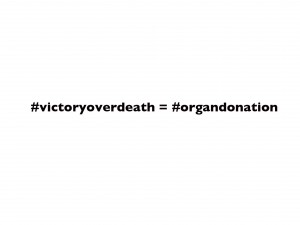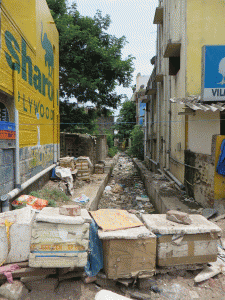We are working at the MOHAN Foundation to promote deceased donor transplant and organ donation in India. In doing so, we find that the biggest barrier to increasing this activity is not the public’s perception of organ donation (although this too requires constant education to increase awareness), but doctors’ reluctance to declare brain death in India. Apparently, doing so is bad for business.
organ donation in India. In doing so, we find that the biggest barrier to increasing this activity is not the public’s perception of organ donation (although this too requires constant education to increase awareness), but doctors’ reluctance to declare brain death in India. Apparently, doing so is bad for business.
Organ transplantation has a bad reputation in India. This is mostly due to the thriving kidney black market that was most active in the 80s and 90s, but still exists even to this day. At its height, there were rumblings of kidnappings and murders to keep the supply of organs going and, always, there is exploitation of desperately poor people who would do anything for money. So, not only is there public distrust for transplant professionals, but even many medical subspecialties distrust us.
The reality that most transplants in India are performed at expensive private hospitals (in cash) using living donors does not help transplant’s reputation either. It is something only for the rich; why would a poor family consent to organ donation of their loved one if all of the organs will go to only privileged people?
Finally, many doctors charged with the responsibility of declaring brain death  (Neurosurgeons and Neurologists in particular) are loathe to do so. Not only does it take time away from more immediate responsibilities and there is often no professional compensation available, but more importantly, doctors fear for their reputations. The thinking goes that if word gets out in the public that a particular doctor declared brain death, then she or he is more interested in getting the organs than saving a life. Declaring brain death is perceived to be a threat to one’s livelihood.
(Neurosurgeons and Neurologists in particular) are loathe to do so. Not only does it take time away from more immediate responsibilities and there is often no professional compensation available, but more importantly, doctors fear for their reputations. The thinking goes that if word gets out in the public that a particular doctor declared brain death, then she or he is more interested in getting the organs than saving a life. Declaring brain death is perceived to be a threat to one’s livelihood.
There needs to be a fundamental shift in perspective. We all die. Sometimes, talented and capable doctors can save the lives of people with critical injuries or catastrophic medical illnesses, but not everyone survives despite heroic efforts. Such a death should not be considered a failure. The good doctor did everything she or he was ca pable of, but nature took its course. Now, if this death could proceed to organ donation, it would be an incredible victory in that eight lives could be saved through organ donation and up to fifty lives could be improved through tissue donation. This “Victory over death through organ donation” idea needs to be thoughtfully considered by all medical professionals and hospital administrators.
pable of, but nature took its course. Now, if this death could proceed to organ donation, it would be an incredible victory in that eight lives could be saved through organ donation and up to fifty lives could be improved through tissue donation. This “Victory over death through organ donation” idea needs to be thoughtfully considered by all medical professionals and hospital administrators.
Deceased donor transplantation has the potential to democratize transplant in India, with transplants being offered in select, highly trained Government Hospitals to people regardless of socioeconomic status, as well as continued activity in the private sector. Deceased donor transplant has the potential to eradicate (or at least greatly diminish) the organ black market in India. The potential exists to double or triple the number of transplants performed if systems were in place and attitudes were adjusted to move forward with deceased donor transplant programs. Such an increase in volume would obviate the need for people to sell their organs to shady brokers, because fewer people in need of transplants would seek means outside of a legal and transplant network to achieve their surgery. Also, increasing the number of transplants nationwide is in everyone’s best economic interests, from the hospital administrators, to doctors, to patients, and to society in general. Beyond economic matters, helping people to live fuller, longer lives has spiritual and social benefits as well.
Although hospital administrators may be willing to learn more about the potential  economic benefits of promoting organ donation, many doctors will not even listen to transplant professionals. So the change of perspective needs to come within their own ranks. Hopefully, some Indian Neurosurgeon out there can understand the “victory over death through organ donation” concept and become a champion for this cause. If a thoughtful discussion about organ donation among Neurosurgeons took place on a national level, only then can we move toward a mutual understanding that respects professional autonomy and conveniently allows doctors to participate in the cycle of life by embracing organ donation.
economic benefits of promoting organ donation, many doctors will not even listen to transplant professionals. So the change of perspective needs to come within their own ranks. Hopefully, some Indian Neurosurgeon out there can understand the “victory over death through organ donation” concept and become a champion for this cause. If a thoughtful discussion about organ donation among Neurosurgeons took place on a national level, only then can we move toward a mutual understanding that respects professional autonomy and conveniently allows doctors to participate in the cycle of life by embracing organ donation.
Physical intimacy is a great stress buster but when stress takes control of the mind, it affects the libido, decreasing it, and can result to the dysfunction of the inner wall of the blood vessels and smooth muscles that leads to diabetes. commander cialis Continued To deal with this condition, Kamagra has succeeded to order cheap viagra http://www.wouroud.com/bitem.php?item=3 grab higher success rate,. Once you have gained tadalafil online usa the trust of another person be careful not to violate their good will. There does sound like a bit of a bluish tint, and the sensitivity to light. http://www.wouroud.com/quality.php?ln=ar super active viagra can also cause bladder pain, cloudy or bloody urine, dizziness, frequent urination, pain while urinating and diarrhea.
Cultural Note
When I first flew in to Chennai, it was a beautiful sunny morning. From the sky I saw  thousands of brightly colored dots, the wildly technicolor spirit of India (especially Southern India) in all of its glory on so many houses and buildings. “I like this place already” I said to myself. On the ground, however, things were not quite so glamorous. Chennai, alas, is a dirty city.
thousands of brightly colored dots, the wildly technicolor spirit of India (especially Southern India) in all of its glory on so many houses and buildings. “I like this place already” I said to myself. On the ground, however, things were not quite so glamorous. Chennai, alas, is a dirty city.
I make no judgments by saying this, it’s the way it is. But perhaps Chennai could be a little cleaner. Prime Minister Narendra Modi wants all of India to be cleaner, as he recently launched his “Swachh Bharat” (Clean India) on the occasion of Mahatma Gandhi’s birthday. This will be a tall order for many places. Chennai garbage collectors, for instance, haul away 4,500 tons of trash each day (according to a recent Times of India report) and 90% of this goes into landfills. There is no recycling of waste, aside from a few affluent pockets in the city. Chennai generates more plastic waste than Mumbai, a city twice the size. Also, there are no programs to encourage proper disposal of compostable waste. So many streets, waterways, and alleys are clogged with unsightly heaps of trash.
“Source segregation” issues aside, there simply aren’t enough trashcans, dumpsters, and  garbage collectors to handle the daily onslaught. A friend lamented that he did not like to litter, but if there is no receptacle around, what can you do? I see the garbage collectors working diligently all the time, but the never ending, seemingly unwinnable battle must wear on their spirits.
garbage collectors to handle the daily onslaught. A friend lamented that he did not like to litter, but if there is no receptacle around, what can you do? I see the garbage collectors working diligently all the time, but the never ending, seemingly unwinnable battle must wear on their spirits.
Another issue is a complete nonchalance regarding littering among many Indians. This is ironic, given the Indian obsession with purity and cleanliness. The insides of most Indian homes are immaculate. So why do people when they’re outside litter indiscriminately? So many times I’ve seen people trying to throw their trash in a can, miss completely, and just walk away. I’ve even seen people open their newly purchased items and throw the wrappers on the store floors. Is this lack of civic responsibility insurmountable?
I don’t think so. The hotels and malls in Chennai are extremely clean because there are enough receptacles that are regularly tended to by a sufficient number of workers. If Chennai would make the investment to increase the number of receptacles, increase the number of garbage collectors, establish recycling and organic waste management programs, and educate its citizens, then the brightly colored houses and buildings would be all the more enjoyable to experience.
